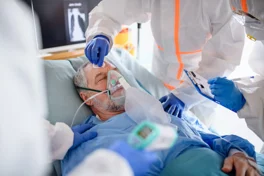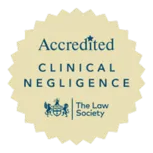
What are the First Signs of Sepsis?
Sepsis occurs when the body creates an overwhelming response to an infection. It can be contracted in various ways (not necessarily through medical negligence) and is, thankfully, uncommon.


Solicitor, Medical Negligence
Sepsis can be a devastating illness, leaving sufferers with life-changing injuries such as limb loss. Early treatment can help to reduce the chance of suffering from these types of serious injuries because many cases of sepsis are caused by bacterial infections and can be treated with antibiotics.
Here at Simpson Millar, our expert team of Medical Negligence Solicitors often see the very devastating impact sepsis has on our client’s lives. Even outside of our working environment, the impact of sepsis can be seen in society with some cases being reported on in the media.
One individual who contracted sepsis and her case was subsequently reported in the media was Jayne Carpenter. Jayne was a nurse took her own life after losing 3 limbs to sepsis.
She went to her doctor with a cough but was diagnosed with sepsis and pneumonia. She subsequently spent 2 months in a coma. Both her legs and one of her arms had to be amputated due to gangrene in an attempt to save her life. Four fingers from her right hand were also amputated. Recounting her experience afterwards, Jayne previously said:
“One minute I had a cough then the next I was on a life support machine. The doctor told Robert that I was suffering from neutropenic sepsis and said she will die if we don’t amputate. All Robert wanted to know was whether I was going to live."




Simpson Millar Solicitors. (n.d.). Sepsis Claims. Retrieved from https://www.simpsonmillar.co.uk/medical-negligence-solicitors/sepsis-claims/ (Accessed: December 30, 2023).
UK Sepsis Trust. (n.d.). UK Sepsis Trust. Retrieved from https://sepsistrust.org/ (Accessed: December 30, 2023).
Wales Online. (2020, December 14). Inspirational campaigner Jayne Carpenter who battled sepsis dies. Retrieved from https://www.walesonline.co.uk/news/wales-news/inspirational-campaigner-jayne-carpenter-who-19460627 (Accessed: December 30, 2023).
BBC News. (2021, November 29). Jayne Carpenter: Nurse left with sepsis injuries dies. Retrieved from https://www.bbc.co.uk/news/uk-wales-59226448 (Accessed: December 30, 2023).
Wales Online. (2022, October 20). Nurse with sepsis took her own life after enduring years of pain. Retrieved from https://www.walesonline.co.uk/news/wales-news/nurse-sepsis-suicide-jayne-carpenter-22125030 (Accessed: December 30, 2023).
UK Sepsis Trust. (n.d.). Sepsis Savvy. Retrieved from https://sepsistrust.org/support-us/campaigns/sepsis-savvy/
(Accessed: December 30, 2023).
UK Sepsis Trust. (n.d.). References and Sources. Retrieved from https://sepsistrust.org/about-sepsis/references-sources/
(Accessed: December 30, 2023).
(n.d.). Sepsis - Who can get it? Retrieved from https://www.nhs.uk/conditions/sepsis/who-can-get-it/ (Accessed: December 30, 2023).
(n.d.). Sepsis - Treatment and recovery. Retrieved from https://www.nhs.uk/conditions/sepsis/treatment-and-recovery/ (Accessed: December 30, 2023).
NHS England. (n.d.). Sepsis - Frequently Asked Questions. Retrieved from https://www.england.nhs.uk/ourwork/clinical-policy/sepsis/sepsis-frequently-asked-questions/ (Accessed: December 30, 2023).
Fill in the form below to get in touch with one of our dedicated team members, or call our team today on: 0800 260 5010